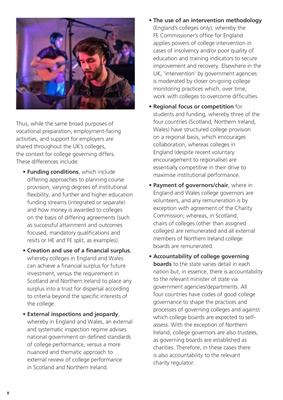
8
Thus, while the same broad purposes of
vocational preparation, employment-facing
activities, and support for employers are
shared throughout the UK's colleges,
the context for college governing differs.
These differences include:
• Funding conditions, which include
differing approaches to planning course
provision, varying degrees of institutional
flexibility, and further and higher education
funding streams (integrated or separate)
and how money is awarded to colleges
on the basis of differing agreements (such
as successful attainment and outcomes
focused, mandatory qualifications and
resits or HE and FE split, as examples).
• Creation and use of a financial surplus,
whereby colleges in England and Wales
can achieve a financial surplus for future
investment, versus the requirement in
Scotland and Northern Ireland to place any
surplus into a trust for dispersal according
to criteria beyond the specific interests of
the college.
• External inspections and jeopardy,
whereby in England and Wales, an external
and systematic inspection regime advises
national government on defined standards
of college performance, versus a more
nuanced and thematic approach to
external review of college performance
in Scotland and Northern Ireland.
• The use of an intervention methodology
(England's colleges only), whereby the
FE Commissioner's office for England
applies powers of college intervention in
cases of insolvency and/or poor quality of
education and training indicators to secure
improvement and recovery. Elsewhere in the
UK, 'intervention' by government agencies
is moderated by closer on-going college
monitoring practices which, over time,
work with colleges to overcome difficulties.
• Regional focus or competition for
students and funding, whereby three of the
four countries (Scotland, Northern Ireland,
Wales) have structured college provision
on a regional basis, which encourages
collaboration, whereas colleges in
England (despite recent voluntary
encouragement to regionalise) are
essentially competitive in their drive to
maximise institutional performance.
• Payment of governors/chair, where in
England and Wales college governors are
volunteers, and any remuneration is by
exception with agreement of the Charity
Commission; whereas, in Scotland,
chairs of colleges (other than assigned
colleges) are remunerated and all external
members of Northern Ireland college
boards are remunerated.
• Accountability of college governing
boards to the state varies detail in each
nation but, in essence, there is accountability
to the relevant minister of state via
government agencies/departments. All
four countries have codes of good college
governance to shape the practices and
processes of governing colleges and against
which college boards are expected to selfassess. With the exception of Northern
Ireland, college governors are also trustees,
as governing boards are established as
charities. Therefore, in these cases there
is also accountability to the relevant
charity regulator.